What can art do?
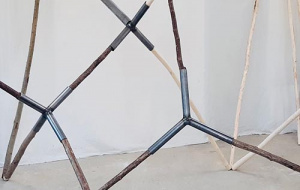 Throughout my time at University College, I wanted to share ideas of art as engagement, and objects as active sites of investigation. I was less interested in questions of what might be considered art, and more concerned with demonstrating various ways in which artistic activity can happen. In other words, rather than ask “what is art?” we can consider “what can art do?”
Throughout my time at University College, I wanted to share ideas of art as engagement, and objects as active sites of investigation. I was less interested in questions of what might be considered art, and more concerned with demonstrating various ways in which artistic activity can happen. In other words, rather than ask “what is art?” we can consider “what can art do?”
In Michaelmas term I focused on engagement, introducing ideas of drawing, performance, and interdisciplinary interactions. I moved sculptural objects about the College, and got people skipping along chalk-drawn lines of Hopscotch Tango. In Hilary term, I demonstrated ways objects can communicate ideas. I worked with students to create “Thinking Objects” relating to their own subject area and with Fellows to create an “Apothecary” of topically painted cast plaster ink bottles.
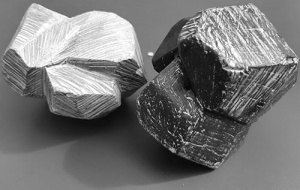 As I couldn’t invite people to my studio in Trinity term, I brought my studio to them virtually, through weekly online life drawing and interactive sculpture sessions. In lieu of a final exhibition, I edited a short film entitled Carbon, which you can view here.
As I couldn’t invite people to my studio in Trinity term, I brought my studio to them virtually, through weekly online life drawing and interactive sculpture sessions. In lieu of a final exhibition, I edited a short film entitled Carbon, which you can view here.
Carbon
The film documents my research and studio practice as I bring an idea from concept to outcome. I highlight themes including the process of thinking through making, connections between drawing and perception, and relationships between natural resources and human environments.
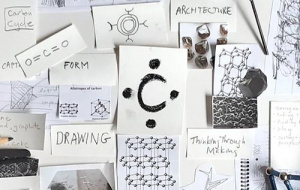 Carbon is the fundamental component of life on earth. From diamond’s glint to graphite’s sheen, carbon atoms bind together in different ways to form materials with strikingly different properties. We draw with charcoal, generate electricity by burning oil, and harness solar energy using carbon nanostructures. We breathe what plants produce: carbon dioxide, which supports and threatens life on Earth, is the inorganic ether linking humans and environments.
Carbon is the fundamental component of life on earth. From diamond’s glint to graphite’s sheen, carbon atoms bind together in different ways to form materials with strikingly different properties. We draw with charcoal, generate electricity by burning oil, and harness solar energy using carbon nanostructures. We breathe what plants produce: carbon dioxide, which supports and threatens life on Earth, is the inorganic ether linking humans and environments.
With this project I wished to utilise properties of carbon to create dynamic sculptures suggesting that outcomes of human activity are often poised between beauty and danger. Ultimately, the sculpture will be exhibited and ignited.
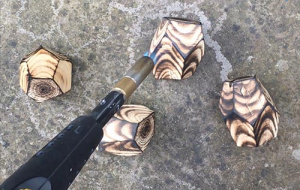 On Thursday evenings throughout the term, I opened my studio via Zoom, to demonstrate various techniques and share my creative process.
On Thursday evenings throughout the term, I opened my studio via Zoom, to demonstrate various techniques and share my creative process.
“Before, I only saw Melissa’s pieces when they were finished and out on the lawn at Univ. But witnessing live how she creates them, using diverse materials and techniques, has been great.”
– Corinna Hartinger (2019, DPhil Interdisciplinary Bioscience)
Life Drawing
Online life drawing sessions might sound like a contradiction in terms, but in our sociable and
productive weekly tutorials we were able to capture many of the characteristics of “real” life drawing classes, by using pre-recorded videos of professional life models.
“Life drawing has been super enjoyable this term – I’ve loved spending a couple of hours each week talking to Melissa, and getting highly personalised advice on my drawings. Plus, it’s been really therapeutic during lockdown, especially when it can feel hard to fill the day (despite the demands of a degree like English). There’s something very liberating about drawing bodies in their every forms, particularly where they’re often otherwise sexualised or objectified – and Melissa’s classes have been a super cool way into this.”
– Saoirse Genoni (2018, English)
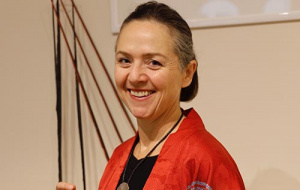 A final message
A final message
As my position as Visitor in the Creative Arts draws to an end, I would like to thank all at University College for welcoming me into their community. It’s been an immensely stimulating, creative and fulfilling year for me. I am honoured to have had the opportunity to live and work alongside you.
Please do keep in touch: you can email me, or find me via my website, or Instagram.
Sculptor Melissa Pierce Murray is Univ’s Visitor in the Arts for 2019-2020. She exhibits internationally and is a member of the Royal Society of Sculptors.
Published: 10 July 2020
